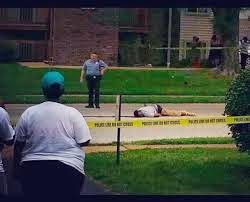The US campaign to defeat dictators
and other brutal regimes.
The war against ISIS is gathering
force in Iraq and inside Syria. Once again our government has mounted
its white steed and is riding into the fray to battle for
civilization and human rights.
Since the end of the Cold War we
have become militant proponents of democracy. Wherever you look our
president, whoever that happens to be at the moment, is the
vigorously denouncing the brutality of various dictators. We went to
war to topple Saddam Hussein. We went to war against Qaddafi in
Libya; we are now engaged and have been in trying to topple al-Assad
in Syria. The campaign against ISIS is presented to us as a campaign
against brutal militants. In each case we are fighting cruelty,
inhumanity. We present ourselves to ourselves and to the world as the
champions of nonviolent political institutions, of democracy where
everybody has equal legal rights and equal protections. We are pure,
when compared to all these dictators.
Sad to say that this propaganda.
The events in Ferguson
have brought to the fore the constant and uninterrupted brutalization
of communities of color and the outright war of police against young
men of color and, more generally, against all young men. An article
in the Tampa Bay Times a
few weeks ago asserted that "every 28 hours an unarmed black
person is shot by a cop." A Los Angeles website, Laist
reports
the research done by the Los Angeles Youth Justice Coalition.”They
found that police killed 589 people in the line of duty between
January 1, 2000 and August 31, 2014. That's about 43 people each year
or one person every eight days.” The majority of them were young
black men.
One
in three black men is imprisoned in the course of their life.
According to some figures, about half of black men are under
supervision of parole authorities. With a sharp increase of persons
imprisoned, state governments have farmed out prisons to private
companies. They manage to turn a profit by keeping prisoners under
utterly inhumane conditions. Often lights, toilets,water do not
function. Sick prisoners have no access to health care. Prison guards
fail to protect prisoners against the assaults by others.
Once
again men of color are the prime victims.
These are terrible facts. If we
added up all the young black men brutalized by police and by the
prison system we might well find that our government is as brutal as
the dictators we have opposed in the last 10 or so years.
But
the precise numbers are not important. What matters is that we are
systematically being fed a view of the world designed to conceal the
enormous failures of our so-called democratic system. According
to the official story, the US is the country that is democratic at
home, where all are equal, and we come to the aid of many abroad. A
columnist for the Boston
Globe, Stephen Kinzer,
observed recently that American media are fascinated with World War
II stories because our role in that war was decent. The many other
wars in which we took the side of dictators for the sake of procuring
raw materials for our corporations do not yield plots for movies, tv
series or fodder for pundits. They have been forgotten.
Day
in day out our attention is drawn to the brutalities of other
dictators or other governments. It takes the month-long
demonstrations not only in this country but all around the world in
response to the killing of Michael Brown, to lift a corner of the
shroud that covers the murderous activities of our own police forces,
and of the federal government that supports those police forces with
more lethal weapons and equipment.
The good news is that more and more
Americans are waking up to this gross malfunction of our government
spite of all the propaganda. This morning's paper reports an opinion
poll in which almost 2/3 of persons asked allowed as how black people
do not receive just treatment from our judicial system. The truth is
slowly leaking out.
But before we, the citizens, and the
government take actions, nothing will change.





